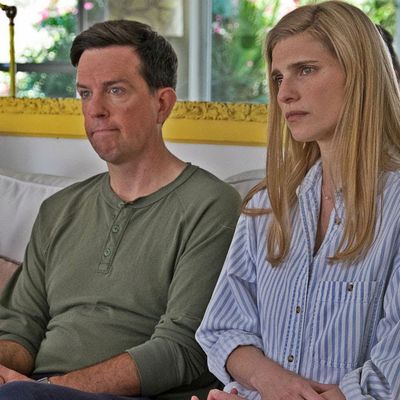
Dont let the bohemian title fool you: Lake Bells I Do  Until I Dont is the most bougie movie ever made. That title actually belongs to the film-within-the-film: a work-in-progress documentary by the movies British agent of chaos, Vivian (Dolly Wells), whose marriage has collapsed and who now argues that the marital contract should have to be renewed every seven years. Because Floridas divorce rates are relatively high, she chooses Vero Beach as her locale and settles on three couples: Alice (Bell) and Noah (Ed Helms), whove struggled to have a child and whose blinds business is about to go into bankruptcy; Cybil (Mary Steenburgen) and Harvey (Paul Reiser), whose 31-year-old union is visibly fraying; and Alices sister Fanny (Amber Heard) and her husband, Zander (Wyatt Cenac), whose hippieish open marriage Vivian intends to represent as a healthy alternative to monogamy.
ThereÔÇÖs nothing the matter with the premise ÔÇö itÔÇÖs inspired. The collision of ┬¡marital nebulousness and virulent showbiz psycho┬¡babble is worthy of the late satirical filmmaker Paul Mazursky, whose radar for cant and self-delusion existed side by side with his affection for his charactersÔÇÖ questing spirit. For a while, I Do ÔǪ Until I DonÔÇÖt bounces along agreeably. ItÔÇÖs more amusing than laugh-out-loud funny, but it has a fast, screwball tempo, and the dark underpinnings are there. CybilÔÇÖs revulsion in the face of HarveyÔÇÖs desperate attempts to be a cool guy is sadly convincing (Steenburgen and Reiser are a good mismatch), and Alice and Noah seem hopelessly out of sync.
But the movieÔÇÖs satirical backbone softens and dissolves, and watching it go wrong might make you realize it wasnÔÇÖt that good to begin with ÔÇö that Bell had been getting by on energy and the audienceÔÇÖs goodwill. Her character, Alice, is a blithering cartoon na├»f, and WellsÔÇÖs motormouthed Vivian has no comic stature: Her foolishness is signaled in every line. (She has an Asian-American sidekick played by Connie Shin whoÔÇÖs a pale echo of DoonesburyÔÇÖs Honey.)
I Do  Until I Dont turns out to be a blaring commercial for marriage  but not by demonstrating that the characters need to explore the tensions in their marriages in exhaustive detail, or that (a more cynical idea) marriage is evolutionarily adaptive, or even that divorce is too traumatizing (emotionally and financially) to be worth it if stuff is more or less okay. No, the writer-director just makes all the tension go away  poof! Cybil doesnt really think Harvey was a schmuck  shes just afraid that his middle-aged panic signals a desire to leave her. Abby isnt really turned off by her dimwitted husband  shes just worried that her infertility has made her a lesser person. Fanny and Zander arent really bohemian free-spirits. Theyre bourgeois conformists in tie-dye hippie clothing.
ItÔÇÖs as if Lake ÔÇö married fairly recently and with two children ÔÇö decided to take a stand for middlebrow domesticity. Or else she was replaced halfway through the shooting with a Stepford wife.
*A version of this article appears in the September 4, 2017, issue of New York Magazine.


